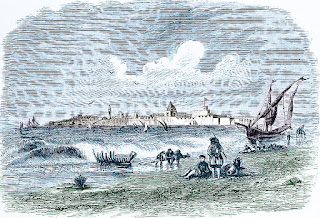…I would like to mention some of the historical facts
connected with this ancient city. The Master related to pilgrims that 'Acco
(Accho, later Acre or 'Akka or 'Akko) was first built by Phoenicians. (‘Acco in
Phoenician means 'curved triangle'.) Egyptian inscriptions of the fifteenth to
thirteenth centuries BC indicate that 'Acco was a part of the ancient Egyptian
Empire. It is also mentioned in Judges I:31.
Afterwards Assyrians and then Persians conquered this area.
They were followed by Alexander the Great, the Seleucids of Syria and the
Armenian king, Tigranes the Great, who, one after the other, took over this
region until the Roman Empire became its ruler.
In 636 AD it was conquered by the Arabs, in 969 by the
Fatimid caliphs of Egypt, in 1079 by the Seljuks, and in 1099 by the Crusaders,
who ruled Acre (as the Christians called it) with only brief interruption for
two centuries.
Baldwin I seized Acre in 1104 and it became a part of the
Christian Kingdom of Jerusalem. In 1187 Saladin raised the banner of Islam on
the towers of Acre, but it was soon recovered for the Christians in the Third
Crusade and remained their capital until the Mamluks of Egypt conquered and
destroyed the city in 1291.
The construction of the second fortification of Acre was
begun in 1202 and completed ten years later. Al-Jazzar fortified the city with
a new wall, partly still visible. After the unsuccessful siege of a few months
in 1799 by Napoleon I following his invasion of Egypt, al-Jazzar, with support
of a British fleet, defeated him. Afterwards the present ramparts were
constructed and the sea wall strengthened.
Ibrahim Pasha with an Egyptian army took 'Akka in 1832 but
in 1840 with the support of British and Austrian naval forces, the fortified
city was restored to the Turks. It remained under Ottoman rule until 1917 when
it was taken by the British Army.
In 1948 the State of Israel was established and 'Akka became
one of its historical cities.
There is a well-known tradition concerning 'Akka which
states: 'Of all shores the best is the shore of Askelon, and 'Akka is, verily,
better than Askelon, and the merit of 'Akka above that of Askelon and all other
shores is as the merit of Muhammad above that of all other Prophets.' (See
Epistle to the Son of the Wolf, p. 178.)
Ashkelon (Askelon or Ascalon) was an ancient sea-port
village on the Mediterranean coast north of Gaza. It was first inhabited about
2000 BC and is mentioned in Egyptian texts of that time. During the next two
millenniums the city was under Egyptian, Assyrian, Babylonian and Hellenic
rule. Nebuchadnezzar destroyed the city in 604 BC and deported its leading
citizens to Babylon, and nearly three centuries later Alexander the Great conquered
Ashkelon on his march to Egypt. Afterwards, in 636 AD, it was taken by the
Arabs.
Today, close to the ruins of that old city, is the new city
of Migdal-Ashkelon. But of all the ancient and much fought-over cities along
the Mediterranean, the Blessed Beauty in many of His Tablets characterized
'Akka as the most ruinous of all. It 'is the most desolate of the cities of the
world, the most unsightly of them in appearance…' (See God Passes By, p. 186.)
- ‘Ali-Akbar Furutan (‘The Story of My Heart)
